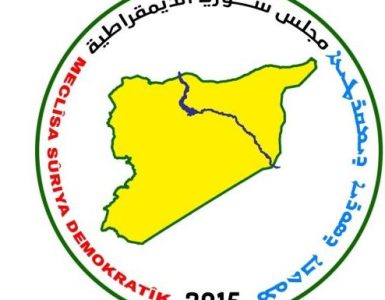By Taim Hassan
Hasakah, Syria (SDC) – Amidst the devastating conflict in Syria, the city of Kobani emerged as a powerful symbol of resistance and unwavering human spirit. This city confronted one of the most brutal terrorist groups, the Islamic State (ISIS), and became a pivotal turning point in the war against them.
While the international community initially disregarded the situation in Kobani, its people and fighters there stood firm against the terrorist forces, inspiring hope and becoming a beacon of resistance. However, even after defeating ISIS, Kobani continues to face new and significant threats. This ongoing struggle serves as a stark reminder of the enduring conflict between the human aspiration for freedom and the forces that seek to suppress it.
Kobani Has Been a Symbol of Resistance since 2012
On July 19, 2012, following the weakening of the Syrian regime’s control in rural areas, the People’s Protection Units (YPG) launched an operation to liberate Kobani. Consequently, it became the first city to be freed from the Syrian regime’s control. It marked the beginning of a revolution that would encompass the regions of northeastern Syria.
The People’s Protection Units (YPG) declared the commitment to defending all components of the region without exception. This commitment was underscored by the immense sacrifices made by the YPG in their subsequent battles against ISIS.
Regional and International Support for ISIS
The ISIS seized vast regions in Iraq and Syria in 2014, exploiting indirect regional and international support. This support included weapons acquired from the deteriorating Iraqi and Syrian armies.
Credible reports revealed Turkey’s support for the group, facilitating the passage of foreign fighters into Syria and purchasing oil from ISIS. Thus, Turkey provided the ISIS with substantial funding.
The ISIS fully captured Raqqa in January 2014, declaring it the capital of its so-called caliphate in June 2014. Subsequently, it captured Mosul and other cities, solidifying its terrorist dominance.
Also: The Intra-Syrian Dialogue is a Vital Necessity for Resolving the Syrian Crisis
ISIS launched an Attack on Kobani in 2014
In September 2014, ISIS launched a full-scale attack on Kobani, employing advanced weaponry and benefiting from logistical support. This support included supplies transported through Turkey.
The attack targeted the east, west, and south of Kobani.
Alarmingly, Turkey appeared to turn a blind eye to the siege of Kobani, with accusations of tacit support for the terrorist group.
Amidst the siege, ISIS released 49 Turkish diplomats who had been held captive in Mosul. This unexpected release fueled speculation about a possible deal between ISIS and Turkey.
Kobani Witnessed a Heroic Struggle Against the ISIS Siege
For 134 days, the People’s Protection Units (YPG) and Women’s Protection Units (YPJ), alongside Free Syrian Army fighters, engaged in a heroic struggle against the ISIS siege. They faced immense challenges, including encirclement and a severe shortage of supplies.
Initially, the US-led Global Coalition hesitated to intervene. However, due to the global pressure, airstrikes against ISIS positions in Kobani were launched in late September 2014.
The Global Coalition described Kobani as a turning point in the war on terror. In this city, ISIS’s military infrastructure was significantly crippled.
The Liberation of Kobani Was on January 26, 2015
On January 26, 2015, the People’s Protection Units announced the complete liberation of the city of Kobani. This marked the first major defeat of ISIS.
This defeat was not just a military victory, but the beginning of ISIS’s decline in Syria and Iraq.
Subsequent military operations were launched to liberate other areas from ISIS. These areas included Tel Hamis, Tel Brak, Tel Abyad (Gire Spi), and the city of Raqqa, which was a stronghold of ISIS.
Kobani Has Faced Numerous Turkish Attacks
Despite the victory over ISIS, Kobani has become a target of Turkish threats. Turkey believes that the Autonomous Administration of North and East Syria (AANES) poses a threat to its regional ambitions. Therefore, Turkey seeks to expand its control under various pretexts.
Over the past years, Turkey has launched numerous attacks on northeastern Syria. These attacks aimed to destabilize the region and create a lack of security that could allow the return of ISIS or similar groups.
Turkey Violates International Laws
The Turkish attacks on Kobani and the areas held by the AANES violate international law principles. The UN Charter prohibits attacks on the sovereignty of other states. Turkey undermines regional stability through its violations.
Also: Suwayda Movement Continues to Concern Authorities in Damascus
The Geneva Conventions also criminalize targeting civilians and infrastructure. However, Turkey has launched strikes that have resulted in the deaths of dozens of civilians. These attacks have also caused significant displacement of people.
Furthermore, Turkey’s support for ISIS through financing and facilitating the entry of terrorists across its borders violates international commitments. This support blatantly violates UN Security Council resolutions specifically designed to combat terrorism.
Kobani’s Message to Humanity
The resistance in Kobani has demonstrated how local forces (YPG and YPJ) could face one of the largest terrorist groups with popular support and determination. It also highlighted the importance of cooperation among people to counter and thwart attacks.
Additionally, it is essential to underscore the need for caution regarding countries that support terrorism. Turkey continues to support factions of the Syrian National Army (SNA) that believe in the terrorist ideology. These factions include many ISIS militants within their ranks. This support poses a threat to regional and international security.
Kobani Has Been a Symbol of Victory
Kobani, a city that defied ISIS and became a symbol of resistance, now faces new threats by Turkey. Turkish actions aim to undermine the gains that have been achieved in Kobani. This resilient city needs global support to preserve its gains and protect its people from future attacks. The events in Kobani serve as a source of inspiration for those struggling for freedom and justice. They demonstrate that resistance can ultimately prevail over terrorism.




